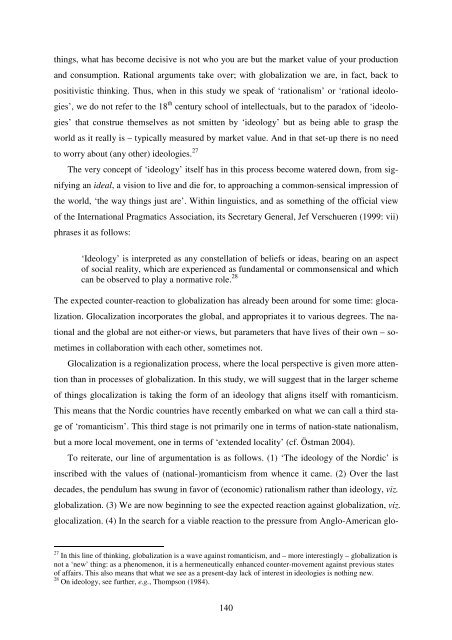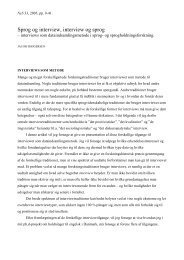Hør dog hvad de siger - Note-to-Self: Trials & Errors
Hør dog hvad de siger - Note-to-Self: Trials & Errors
Hør dog hvad de siger - Note-to-Self: Trials & Errors
You also want an ePaper? Increase the reach of your titles
YUMPU automatically turns print PDFs into web optimized ePapers that Google loves.
things, what has become <strong>de</strong>cisive is not who you are but the market value of your production<br />
and consumption. Rational arguments take over; with globalization we are, in fact, back <strong>to</strong><br />
positivistic thinking. Thus, when in this study we speak of ‘rationalism’ or ‘rational i<strong>de</strong>olo-<br />
gies’, we do not refer <strong>to</strong> the 18 th century school of intellectuals, but <strong>to</strong> the paradox of ‘i<strong>de</strong>olo-<br />
gies’ that construe themselves as not smitten by ‘i<strong>de</strong>ology’ but as being able <strong>to</strong> grasp the<br />
world as it really is – typically measured by market value. And in that set-up there is no need<br />
<strong>to</strong> worry about (any other) i<strong>de</strong>ologies. 27<br />
The very concept of ‘i<strong>de</strong>ology’ itself has in this process become watered down, from sig-<br />
nifying an i<strong>de</strong>al, a vision <strong>to</strong> live and die for, <strong>to</strong> approaching a common-sensical impression of<br />
the world, ‘the way things just are’. Within linguistics, and as something of the official view<br />
of the International Pragmatics Association, its Secretary General, Jef Verschueren (1999: vii)<br />
phrases it as follows:<br />
‘I<strong>de</strong>ology’ is interpreted as any constellation of beliefs or i<strong>de</strong>as, bearing on an aspect<br />
of social reality, which are experienced as fundamental or commonsensical and which<br />
can be observed <strong>to</strong> play a normative role. 28<br />
The expected counter-reaction <strong>to</strong> globalization has already been around for some time: gloca-<br />
lization. Glocalization incorporates the global, and appropriates it <strong>to</strong> various <strong>de</strong>grees. The na-<br />
tional and the global are not either-or views, but parameters that have lives of their own – so-<br />
metimes in collaboration with each other, sometimes not.<br />
Glocalization is a regionalization process, where the local perspective is given more atten-<br />
tion than in processes of globalization. In this study, we will suggest that in the larger scheme<br />
of things glocalization is taking the form of an i<strong>de</strong>ology that aligns itself with romanticism.<br />
This means that the Nordic countries have recently embarked on what we can call a third sta-<br />
ge of ‘romanticism’. This third stage is not primarily one in terms of nation-state nationalism,<br />
but a more local movement, one in terms of ‘exten<strong>de</strong>d locality’ (cf. Östman 2004).<br />
To reiterate, our line of argumentation is as follows. (1) ‘The i<strong>de</strong>ology of the Nordic’ is<br />
inscribed with the values of (national-)romanticism from whence it came. (2) Over the last<br />
<strong>de</strong>ca<strong>de</strong>s, the pendulum has swung in favor of (economic) rationalism rather than i<strong>de</strong>ology, viz.<br />
globalization. (3) We are now beginning <strong>to</strong> see the expected reaction against globalization, viz.<br />
glocalization. (4) In the search for a viable reaction <strong>to</strong> the pressure from Anglo-American glo-<br />
27 In this line of thinking, globalization is a wave against romanticism, and – more interestingly – globalization is<br />
not a ‘new’ thing: as a phenomenon, it is a hermeneutically enhanced counter-movement against previous states<br />
of affairs. This also means that what we see as a present-day lack of interest in i<strong>de</strong>ologies is nothing new.<br />
28 On i<strong>de</strong>ology, see further, e.g., Thompson (1984).<br />
140



